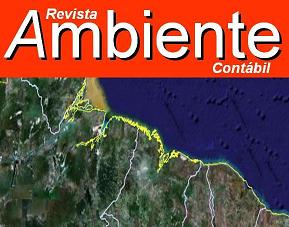ENVIRONMENTAL ACCOUNTING - PRACTICE ANALYSIS AS AN INTENSIFIER OF SOCIAL ENVIRONMENTAL INFORMATION ON FINANCIAL STATEMENTS
DOI:
https://doi.org/10.21680/2176-9036.2016v8n1ID7423Abstract
Environmental accounting as a subset of traditional accounting, aims to: identify, measure and clarify economic and financial transactions that are related to the protection, preservation and environmental recovery, which occurred in a given period, in order to provide the disclosure of a company. Considering this, it is discussed what contribution environmental accounting is providing for the disclosure of environmental information. So, the general objective of this paper is to analyze other papers that investigated the disclosure of environmental information and environmental accounting, published in accounting journals, classified as qualis B1 and B2, from 2011 to 2014. We analyzed 16 papers out of 640, using content analysis techniques. The research is considered descriptive concerning the objectives and uses qualitative and documentary approach in the procedures. As a result of the analysis, it is concluded that environmental accounting is not used to disclosure environmental information.
Keywords: Disclosure, Environmental Accounting, Environmental Education.
Downloads
References
ARROYO, M. G. Ofício de Mestre: imagens e autoimagens. 14, ed. Rio de Janeiro: Vozes, 2013.
BARDIN. L. Análise de conteúdo. Tradução: Luis Antero Reto, Augusto Pinheiro. São Paulo: Edições 70, 2011.
BRASIL. Lei no 9.795 de 27 de abr. de 1999. Dispõe sobre a educação ambiental, institui a Política Nacional de Educação Ambiental e dá outras providências. Diário Oficial [da] República Federativa do Brasil, Brasília, DF, 28de abr.1999. Disponível em:<http://www.planalto.gov.br/ccivil_03/Leis/L9795.htm>. Acesso em: 24 ago. 2014.
CARNEIRO, J. D., et al. Proposta nacional de conteúdo para o curso de graduação em Ciências Contábeis. Fundação Brasileira da Contabilidade, Brasília, 2008.
FERREIRA, A. C. de S. Contabilidade Ambiental – uma informação para o desenvolvimento sustentável. São Paulo: Atlas, 2003.
HENDRIKSEM. E. S., BRREDA, M. F. V. Teoria da Contabilidade. Tradução: Antonio Zoratto Sanvicente, São Paulo: Atlas, 1999.
LOUREIRO, C. F. B. Trajetória e Fundamentos da Educação Ambiental. São Paulo: Cortez, 2004.
PAIVA, P. R. de. Contabilidade Ambiental – evidenciação dos gastos ambientais com transparência e focada na prevenção. São Paulo: Atlas, 2003.
PROGRAMA NACIONAL DE EDUCAÇÃO AMBIENTAL - ProNEA / Ministério do Meio Ambiente, Diretoria de Educação Ambiental; Ministério da Educação. Coordenação Geral de Educação Ambiental. - 3. ed - Brasília : Ministério do Meio Ambiente, 2005.
RAUPP, F. M., & BEUREN I. M. Metodologia da pesquisa aplicável às ciências sociais. In: BEUREN, I. M. (Org). Como elaborar trabalhos monográficos em contabilidade: teoria e prática. São Paulo: Atlas, 2003.
REIGOTA, M.O que é Educação Ambiental. 2. ed. São Paulo: Editora Brasiliense, 2009.
RIBEIRO, M. de S. Contabilidade ambiental. São Paulo: Saraiva, 2005
SAUVÉ, L. Educação Ambiental: possibilidades e limitações. Educação e Pesquisa, São Paulo, v. 31, n. 2, p. 317-322, maio/ago. 2005.
SCHMIDT, P. A classificação da contabilidade dentre os ramos do conhecimento humano. Caderno de Estudos, São Paulo, FIPECAFI, v.10. 17, p.9-22, janeiro/abril 1998.
SILVA. M. B. de, GRIGOLO, T. M. Metodologia para a iniciação científica à prática da pesquisa e da extensão II. Caderno Pedagógico. Florianópolis: Udesc, 2002.
SOARES, M. Para quem pesquisamos? Para quem escrevemos? In: Para quem pesquisamos? Para quem escrevemos? O impasse dos intelectuais. LEITE, R. G. (org). 3.ed. Coleção questões de nossa época ; v.31. São Paulo: Cortez, 2011.
TINOCO, J. E. P.; KRAEMER, M. E. P. Contabilidade e gestão ambiental. São Paulo: Atlas, 2004
TRIVIÑOS, A. N. S. Introdução à pesquisa em ciências sociais: a pesquisa qualitativa em educação. São Paulo: Atlas, 2009.
Downloads
Published
How to Cite
Issue
Section
License
Authors who publish in this magazine agree with the following terms:
Authors keep the copyrights and concede the right of its first publication to the magazine. The work piece must be simultaneously licensed on the Creative Commons Attribution Licence which allows the paper sharing, and preserves both the author identity and the right of first publication to this magazine.
Authors are authorized to assume additional contracts separately, to not-exclusively distribution of the paper version published in this magazine (e.g.: publish in institutional repository or as a book chapter), with the author identity recognition and its first publication in this magazine.
Authors are permitted and stimulated to publish and distribute their papers online (e.g.: in institutional repository or on their personal webpage), considering it can generate productive alterations, as well as increase the impact and the quotations of the published paper.
Creative Commons - Atribuição-NãoComercial-SemDerivações 4.0 Internacional.


 Português (Brasil)
Português (Brasil) English
English Español (España)
Español (España)


